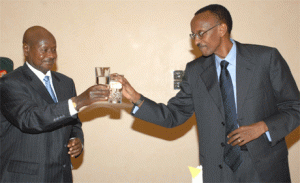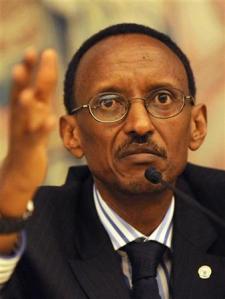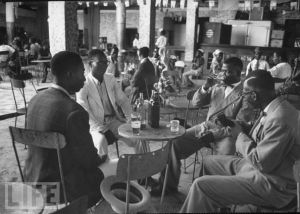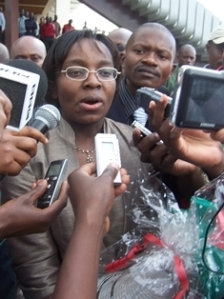Kagame Is Oppressive and Should not Be Praised
An oppressive dictator, regardless of his former “glory” should not be praised. When he is killing people in front of your eyes, it’s no use to anyone for you to say, “oh but he saved people in the past.” Yes, that was in the past. What about now? What about the people he killed in the past?
Rwanda’s history is complicated, but there is nothing complicated about the fact that Kagame is oppressive, and that it’s about time for him to change.
By changeispossible – http://www.theglobeandmail.com/community/?userid=60566407&plckUserId=60566407.
March 10, 2010 No Comments
Rwandan Ex-Minister and Ex-Ambassador Flees To Burundi
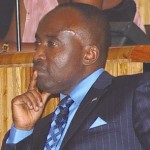
Al Hajj Andre Habib Bumaya
Kigali – Following years of speculation after he lost his job, ex-Foreign Affairs Minister Al Hajj Andre Habib Bumaya may have finally left the country, and the party leader and colleagues in the Ideal Democratic Party (PDI) say it is his right to leave.
Considered the star entrant in President Paul Kagame�s first government 10 years ago, Mr. Bumaya was just a government employ before the Genocide. The latter government posted him to Libya as ambassador and later held to two cabinet positions � only to be kicked out and followed with brutal criticism from the President.
The ex-diplomat�s political time-table in the country seems to have come to an end in February.
Mr. Bumaya supposedly left the country on Feb. 22 headed for Burundi. A week later on Feb 27, the politician who rode to fame on the Muslim ticket, emailed PDI boss and current Internal Security Minister Sheikh Musa Fazil Harelimana.
The announcement
The news about Mr. Bumaya�s exile was communicated behind closed-doors by Sheikh Harelimana to party members from across the country at a party conference on Saturday. As the cameras and microphones were on, Mr. Harelimana reaffirmed the party�s support for President Kagame�s candidacy in the August poll.
Mr. Harelimana said he is barely even a-tenth of the person of President Kagame. After the ceremonial speeches and the journalists were not in the room, Mr. Harelimana broke the news nobody was expecting.
Andr� Bumaya is no longer a member of PDI, revealed Mr. Harelimana, according to different delegates who attended the conference. Bumaya wrote to him an email saying he had to leave the country for �personal reasons� and that he will communicate his political stand in the coming days.
For that matter, Mr. Harelimana continued, we shall consider him not a member.
Mr. Bumaya was among the 20 ministers in President Kagame�s first cabinet in 2000 when he replaced ex-leader Pasteur Bizimungu. Mr. Bumaya was named Foreign Affairs Minister, a post he lost two years later to Dr. Charles Murigande.
The soft-spoken, but arrogant Mr. Bumaya, who often rode to the top on the fact that he was head of the PDI party – considered to be for Muslims, was moved to the Ministry of Public Service. Prior to the 2003 Constitution which outlawed religious links for parties, the �I� was �Islamic�, but was changed to �Ideal�.
President Kagame again sacked Mr. Bumaya from cabinet in March 2006 amid continued criticism from Parliament, media and trade unions blaming him for the woos that had grappled the Ministry of Labour and Public Service.
In the same period up until recently, government came under immense pressure from donors to reform the public service. Thousands of government employees lost their jobs. Bitter complaints however emerged from CESTRAR � the national trade union umbrella about the way the retrenchment program had been handled.
In 2005, a Parliamentary probe was instituted to look into the complaints. A damning report accused Mr. Bumaya of implementing the massive retrenchment prior to the creation of the Constitutional Public Service Commission; failing to create a national labour policy; and malpractices in the hiring and firing processes.
As indication that he had clearly fallen out of favour with the appointing authority, Mr. Bumaya was finally thrown out of government in March 2006, but not without fierce criticism from the President.
President Kagame had openly attacked Mr. Bumaya in a closed-door government retreat a month earlier. In a clear reference to Mr. Bumaya, President Kagame gave him as an example of Cabinet ministers, who he said go around complaining that they don’t posses recruitment powers. The President castigated such ill-complaints saying they were only bent on taking the country back to the old corrupt regimes.
Enters Sheikh Musa Fazil Harelimana
PDI insiders who have watched the political drama unfold in the small party which has risen to glory on the strength of the Rwanda Patriotic Front (RPF) say the career of Mr. Bumaya started to get in trouble following the 2003 presidential poll.
Mr. Kagame was overwhelmingly elected with Sheikh Musa Fazil Harelimana serving as the vice president of the electoral commission. Mr. Harelimana was eventually appointed Governor of the trouble-ridden Western Province.
In the March 2006 cabinet changes, Mr. Harelimana was brought into government as Internal Security Minister � coincidentally as party rival Mr. Bumaya was thrown out.
The humiliation seemed to have been overwhelming that Mr. Bumaya moved out of the country � prompting the rumour-mill to take its toll that he had fled. It later emerged that he was in the United States doing a masters in international relations.
Mr. Harelimana�s rise up the party ladder was not about to stop. In 2007, he was elected to lead the small party, on the strong backing of the head of the Islamic faith in the country Sheikh Habimana Swaleh. This seems to have sealed the political relevance of Mr. Bumaya.
Though Mr. Bumaya became the spokesman of PDI, observers believed he was no longer politically relevant anymore. His appearance at the high-table was no more, as the profile of the Internal Security Minister got more entrenched.
Party �owner�?
The fall from grace for Mr. Bumaya was clearly over, for a man who appeared from the blue to be named ambassador to Libya by the post Genocide government.
Established in 1991 as the Islamic Democratic Party (Parti d�mocratique islamique), it came up at the time ex-president Habyarimana Juvenal was opening up political space to multiparty politics.
PDI joined forces with the RPF in the 2003 legislative election and won two seats in the Chamber of Deputes. Its leader was Mr. Bumaya.
In the current Lower Chamber, there are two Deputes representing PDI.
ARI-RNA rnanews.com
March 9, 2010 No Comments
Rwanda’s blood-soaked history becomes a tool for repression
by Geoffrey York – Globe and Mail (theglobeandmail.com)

Victoire Ingabire dared to speak of Hutus victims of genocide
Kigali � The symbolism was incendiary. In front of the mass graves where 250,000 genocide victims are buried, a Rwandan politician dared to speak of the Hutus who were killed in those same terrible months in 1994.
Perhaps more astonishingly, Victoire Ingabire was not imprisoned for her taboo comments � not so far, at least, although the police have interrogated her three times and accused her of the crime of spreading �divisionism.�
Her challenge is posing an uncomfortable dilemma for the minority Tutsi-led government that dominates Rwanda. Sixteen years after the genocide of an estimated 800,000 Tutsis by Hutu extremists, can the authorities tolerate a political candidate who appeals openly to the Hutus who still comprise 85 per cent of Rwanda’s population?
How long can the government use the genocide as a justification for strict controls on the political system? And who decides the official history of the genocide?
The woman at the centre of the storm is an unlikely politician: a cheerful 41-year-old emigrant who has worked as an accountant at a U.S. company in the Netherlands for the past decade.
She wears a frilly-strapped dress and giggles merrily when she is asked about the barrage of wild attacks on her in Rwanda’s state-controlled media.
But she is backed by many of the Hutus who fled to Europe and North America during the Rwandan wars of the 1990s. She clearly has money and resources. She rents a large house in one of Kigali’s most exclusive neighbourhoods, where she has a Land Cruiser parked in the driveway.
Ms. Ingabire’s decision to return to Kigali this year has sent shock waves through Rwandan politics. In a country where ethnic divisions are officially never discussed, she has dared to raise Hutu grievances � especially the killing of thousands of Hutus in 1994 and 1995, which she describes as a �crime against humanity.�
It’s a potent appeal. Many Hutus feel excluded from power, excluded from the best jobs and schools, and afraid to speak out. It was to them that Ms. Ingabire was deliberately appealing when she returned to Rwanda in January � after 16 years in exile � and made her controversial comments at the genocide memorial.
Ms. Ingabire has carefully couched her appeal in diplomatic language. She condemns the genocide, calling for reconciliation and dialogue. She denounces �extremists� on all sides. She urges the authorities to bring all criminals to justice, regardless of ethnicity. She pledges to work for a peaceful country, united in mutual respect.
Yet merely by talking of Hutu victims, she has triggered a firestorm of reaction. She and her assistant were assaulted by a gang of young men in a government office. Her assistant, who was badly beaten, has been jailed for �genocide� crimes. She is facing a police investigation for her alleged �genocide ideology.� And even the country’s powerful President, Paul Kagame, has warned that �the law will catch up with her� � a clear threat that she will be arrested.
At the heart of the battle between Ms. Ingabire and Mr. Kagame is a stark disagreement about Rwanda’s identity. The President argues that any talk of ethnicity must be suppressed because Rwanda is still in a fragile post-genocide period, where hatred and violence could rise again. His opponent sees this as an excuse for repression, leading only to resentment and bitterness among those who cannot speak out.
It is unclear whether the government will permit Ms. Ingabire to challenge Mr. Kagame in the presidential election in August. The President won the last election with an official margin of 95 per cent, and he has brooked no real opposition since 1994, when he led the Tutsi rebels who defeated the genocidal Hutu regime.
So far, Ms. Ingabire has been denied permission to gather the 200 signatures that she needs to register her political party. She is routinely subjected to fierce attacks in the pages of Rwanda’s only daily newspaper, the state-connected New Times, which refuses to publish her responses to the attacks.
�I don’t know why the government is so afraid of me,� she says. �They watch me and follow me all the time. I know anything can happen to me � they can arrest me, they can kill me.�
The managing director of the New Times, Joseph Bideri, confirmed that the newspaper refuses to give any �space� to Ms. Ingabire’s responses. He wrote a personal letter to her on Jan. 22, vowing she would never get a �platform� in the newspaper because she is a �genocide denier.�
In an interview, however, Mr. Bideri was unable to provide any evidence that Ms. Ingabire denies the genocide. In fact, in her public speeches and in a lengthy interview with The Globe and Mail, she repeatedly acknowledged and condemned the 1994 genocide. She draws a distinction between the slaughter of the Tutsis � which she calls a genocide � and the killings of many Hutus, which she describes as a �crime against humanity.�
Although she emigrated to the Netherlands shortly before the genocide began, Ms. Ingabire’s own family suffered in the genocide. Her brother was killed in 1994 because he was mistaken for a Tutsi.
�When people talk about the pain they feel, they need to understand that everybody feels pain,� she says. �We have to understand the pain of others. When I condemn the genocide, I’m also thinking of my brother. Not all Hutus are killers, and not all Tutsis are victims.�
International human-rights groups, including Amnesty International and Human Rights Watch, have criticized the Rwandan government for attacking and harassing opposition leaders such as Ms. Ingabire. Amnesty says the Rwandan law on �genocide ideology� is so vague and ambiguous that the authorities can use it to suppress dissent.
There is strong evidence to support Ms. Ingabire’s allegations of war crimes against Hutus. For example, a United Nations investigator in 1994 estimated that 25,000 to 45,000 civilians, primarily Hutus, were killed by the Rwandan Patriotic Front � the army of Mr. Kagame, now the governing party. Many other civilians, including thousands of Hutu refugees, were killed in further attacks in later years. Only a small handful of RPF members have been prosecuted for the Hutu deaths, which remain a taboo subject in Rwanda.
Ms. Ingabire says she doesn’t know how many Tutsis died in 1994, how many Hutus died, or even whether the number of Tutsi victims was larger than the number of Hutu victims. Some observers say she is leaving the impression of an equivalency between the two sides, despite historical evidence that the Tutsi victims were far more numerous and were the only ones subjected to a deliberate campaign of attempted extermination.
But even the Rwandan government has struggled with how to write the history of the genocide. At the memorial where 250,000 victims are buried, a guide says it commemorates only the Tutsi victims of the genocide. Yet he distributes an audio guide that calls it a memorial to the �Tutsi and moderate Hutu peoples� who were killed.
Didas Gasana, editor of a weekly newspaper whose staff is often harassed and threatened by the authorities for its independent views, says the government needs to provide justice and truth to the Hutu victims. �There needs to be debate and justice and openness,� he says. �It’s a part of history that can’t be denied.�
Mr. Gasana is himself a Tutsi. And despite the official view that ethnicity has disappeared, he says he is often told privately by government officials that he should not write such critical articles � because he is a Tutsi.
Geoffrey York – http://www.theglobeandmail.com/news/world/rwandas-blood-soaked-history-becomes-a-tool-for-repression/article1487568/.
March 9, 2010 No Comments
Strange Times in Kigali
Source: Christopher Vourlias – March 4, 2010.
I returned to Kigali this week with the hopes of enjoying some downtime before heading to eastern Congo. Sadly, this was not to be the case. As I recently reported, things in everyone�s favorite central African autocracy have taken a turn for the dysfunctional of late, even by this region�s strange standards. Grenade attacks, coup rumors, renegade generals on the run. If it weren�t for the fact that there�s not a beach in sight, I would�ve sworn I was back in Bujumbura.
Front and center has been the bizarre case of Lieutenant-General Kayumba Nyamwasa, a former army chief of staff who � after rumored sightings in Uganda � has apparently resurfaced in South Africa after fleeing the country last week. Kayumba, who was until recently serving as Rwanda�s ambassador to India, has had a strained relationship with the RPF leadership, after he was allegedly linked to a failed coup attempt in 2003. The diplomatic posting seems to reflect the conventional wisdom in Kigali, which is to keep your friends close, your enemies closer, and your failed-coup leaders in India. Uganda�s Sunday Vision reported on Kayumba�s contentious relationship with the government, citing local reports linking him to the troubled Green Party, as well as rumors that �no government official or even fellow soldiers attended the funeral of [Kayumba's] mother recently,� which is a dark tiding indeed for a Rwandan political figure.
Yesterday, a clearly peeved PK gave a press conference here in Kigali, at which he dispelled any rumors that the fleeing general � as well as another former army officer, Patrick Karegeya � had been plotting a coup against him, according to South Africa�s Independent.
�Nobody, absolutely nobody, not even Kayumba, can carry out a coup here. Think about it and you�ll come to the conclusion no one can carry out a coup� in Rwanda, the president said.
�People can only dream about it, wish for it; I believe what I�m telling you,� Kagame said.
Kagame went on to add: �Never ever ever ever ever. Never. Ever.�
The press conference comes on the heels of an announcement by the Prosecutor General Martin Ngoga, who told reporters with a straight face on Tuesday that the Kigali grenade attacks of last month have now been linked to none other than Lt. Gen. Kayumba Nyamwasa and Patrick Karegyeya. This comes after officials stated just hours after the attacks that two suspects had been apprehended, and that, in the definitive words of police spokesman Eric Kayiranga, �they belong to the Interahamwe militia.�
The Rwanda News Agency comments on the sudden about-face.
When three grenades exploded in Kigali two weeks ago and another in Huye district a week before, Police Spokesman Superintendent Eric Kayiranga quickly said investigations showed that Rwandan FDLR rebels were behind them.
The link has not been raised again. On Tuesday, the National Prosecuting Authority suddenly claimed that Gen. Kayumba Nyamwasa and Col. Patrick Karegeya were behind the grenade attacks. On Wednesday, President Kagame said the link between these two scenarios might be possible.
Why would former RPF stalwarts now be canoodling with the Interahamwe? Exactly how many FDLR Hutus do you think are on Lt. Gen. Faustin Kayumba�s Christmas-card list?
Undeterred by the hilarity of their accusations, the RPF today released photographic evidence that Messrs. Kayumba and Karegeya are, indeed, plotting with Interahamwe militia. �We finally have our smoking gun,� said Kagame.
The Kayumba saga comes against a backdrop of increasing intimidation and harassment of opposition politicians, as I�ve reported before. These have included threats most foul against at least three prominent opposition figures � Victoire Ingabire, of the FDU-Inkingi Party; Bernard Ntaganda, of the Parti Social-IMBERAKURI; and Frank Habineza, of the Democratic Green Party � and have (predictably) drawn outraged cries from the international community.
President Kagame, of course, has repeatedly defended his actions, citing the ever-present threat of Hutu rebels to the east and fifth columnists within. In an op-ed for The Guardian, Stephen Kinzer sums up the Kagame position.
He believes western human rights activists underestimate the prospects for a new outbreak of ethnic violence in Rwanda, as well as the danger of allowing ethnically charged speech. �We�ve lived this life,� he said angrily at a news conference. �We�ve lived the consequences. So we understand it better than anyone from anywhere else.�
The levels of intrigue here are�intriguing. Kagame is a master manipulator, who has repeatedly used the genocide as a pretext for bullying the international community and cracking down on internal dissent. The refrain of �we understand it better than anyone from anywhere else� has, in some form or other, become the de facto position of the Kagame administration. It is part of its us-against-the-world mentality, which has always included, as a lingering subtext, a reminder of how the West failed Rwanda during its darkest hour.
The president is a grand strategist, as PR-savvy as any American exec, and observers in this country are always forced to consider how a given event � whether it be grenade attacks in Kigali, or the return of a rabble-rousing exile � is being manipulated by the man upstairs. However damaging or threatening the latest news might seem, you know it is being redacted in His Excellency PK�s enigmatic noggin, before being regurgitated in a way that, ultimately, casts the Kagame regime in an ever more righteous light. Ingabire, for example, has been given a relatively free hand (by Rwandan standards) to state her case to the foreign press. But is Kagame simply holding back because the international spotlight is on her? Or is he playing a more patient hand, perhaps giving Ingabire enough rope to (metaphorically, of course) hang herself?
(The same laissez-faire attitude, unfortunately, has not been extended toward her erstwhile assistant, Joseph Ntawangundi, who just three days after being attacked alongside Ingabire, was promptly arrested and locked up on an outstanding warrant for crimes committed during the genocide.)
I�m not entirely sure what to make of these opposition leaders. Frank Habineza, President of the Democratic Green Party of Rwanda, for example, clumsily played the genocide card while appealing to the West to put pressure on Kagame for his repressive political tactics.
�We do not want the international community to wait, like it waited in 1994,� said Habineza, drawing a parallel that was unlikely to win him many fans. (You can hear more from Habineza here.)
And then there�s Ingabire. I�ve already written a bit about her political aspirations, after spending nearly 16 years in exile in Europe. The would-be president quickly stirred controversy by making some politically charged comments about Hutu victims at the genocide memorial. This more or less occurred while she still had crumbs from the in-flight meal on her chin.
Given such blatantly ethnic posturing � as well as some of the questionable figures looming in her background � it is hard to accept her intentions at face value. Likewise, the clumsy, stage-managed episode involving her supposed asylum request at the UK High Commission makes you wonder whether Ingabire isn�t as much a cool calculator as the man she hopes to dethrone. And you have to ask why someone so deeply concerned with the future of her country waited this long to return, anyway.
Recently Ingabire claimed that if the election were to be held tomorrow, the people would surely vote FDU into power, �because they know who we are.�
I don�t want to take anything away from the average man-on-the-collines here in Rwanda. I would like to give Rwandans � particularly the rural poor, who make up the bulk of this country�s population � the benefit of the doubt, and assume that, come August, they can and will calmly file to the polls with a selfless democratic spirit and full of only the highest of high-minded aspirations.
Unfortunately, that goes against everything I know about electoral politics in this region. Given the amount of time she has had to �campaign� in the country, I suspect most voters don�t know all that much about who Ingabire is. They simply know that she is a Hutu, and in a country where that group still holds a roughly 85 percent majority, she could very well be banking on the fact that that�s all they need to know. You can hardly blame the president, then, for being a bit concerned at the rumblings from below. And you have to wonder just what steps he might take in the next few months to suppress them.
March 7, 2010 No Comments
Kagame Attacks Security Apparatus Over General Nyamwasa
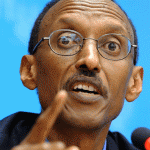
Paul Kagame
Kigali: President Paul Kagame hinted on Wednesday that the way the security apparatus handled the fugitive General Faustin Kayumba Nyamwasa could have contributed to his fleeing, a criticism likely to lead to some heads rolling, RNA reports. The exiled journalist Mr. Charles Kabonero also came under the President’s radar.
Gen. Kayumba was summoned by security officials on Thursday night � a day before he fled the country over serious criminal charges, the President revealed. However, the officials who handled his case could have been influenced by �family relations�, according to Mr. Kagame.
�In Rwandan society, there are still so much family relations and friendship,� said Mr. Kagame. �They even gave him the time to go and think about the accusations so that they can start from there the next day.�
He added: ��there was overwhelming evidence backing the charges that he was not able to respond to some. If those interrogating him had followed this lead, he could not have left.�
Mr. Kagame said Gen. Kayumba could have fled the country because his plans had been revealed to him by security officials who indicated to him that they were aware of whatever he was planning.
�Never� a coup in Rwanda, �not like Niger�
The President also dismissed suggestions that General Kayumba and Col. Karegeya were close to him. �Those were not my colleagues. Am above these people and what they stand for,� he said.
�Kayumba, Karegeya�NO,� the President said. �I don�t drink with them, I never did.�
�It will be an insult to me to reduce myself to their level,� he added in gestures which indicated he was becoming angry with the whole situation.
Responding to another question that there have been rumours of a coup plot in which Gen. Kayumba and Karegeya have been named, President Kagame said �never�, �nobody can�, describing such a suggestion as �wishful thinking� for anybody to imagine that happening here.
�Maybe in Habyarimana�s period or before�,� he added spreading his hands in vigorous gestures.
The President also said Rwanda is �not like Niger where soldiers� do whatever they link with the country. He said Rwanda has established solid institutions for the last 16 years that cannot be possible for coup.
Regional dimension
He said people �should sleep and wake up� without any worries. �Don�t waste your time. Go to bars and drink you will wake up to find Rwanda is still going on.�
The President said his responsibility is ensuring stability. �If you are tired, you go out and leave us in our country,� he said. Mr. Kagame also revealed that Col. Karegeya has been �transacting� his activities in the region, adding that the exiled former head of the External Security Organisation (ESO) has been moving from one country to another in this region.
He said government is employing all mechanisms available �including extradition� with the countries concerned, but did not name any to have the two officers face justice. The President said just like Rwanda would not want to have destabilizing forces in neighbouring countries, Rwanda considers the same principle.
Kabonero in spotlight
The controversial tabloid UMUSESO also came under the spotlight in the President�s press conference. In the first reaction to allegations which arose several years ago suggesting that exiled publisher Mr. Charles Kabonero was in contact with exile ex-junior Abdul Ruzibiza, with plans to cause chaos in Kigali, Mr. Kagame did not mince any words.
Mr. Kagame said some journalists also have some cases to answer for in relation Gen. Kayumba and Col. Karegeya. �There are those who found Karegeya in South Africa to speak to him. There are even those who went there but have not returned,� he said, in reference to Mr. Kabonero, who is said to be in South Africa seeking asylum to North America or Europe.
Without categorically naming Mr. Kabonero, the President said there are some journalists who were found with documents detailing a plan to cause state insecurity.
��which I think is still being investigated,� he revealed.
Possible FDLR link to Kayumba
When three grenades exploded in Kigali two weeks ago and other in Huye district a week before, Police Spokesman Superintendent Eric Kayiranga said investigations had shown that Rwandan FDLR rebels were behind.
The link has not been raised again. On Tuesday, the National Prosecuting Authority revealed that Gen. Kayumba Nyamwasa and Col Patrick Karegeya were behind the grenade blasts. On Wednesday, President Kagame said the link between the two scenarios can also be possible.
Without being categorical, the President said the security apparatus is looking at all leads including a possibility that the ex-officers could be working with the rebels.
Source: RNAnews.
March 4, 2010 1 Comment
Rejoinder To The Article �Will Ingabire Be Rwanda�s Saviour?�

Victoire Ingabire
On 24th February, Mr Andrew Mwenda (independent.co.ug) published an article titled �Will Ingabire be Rwanda�s saviour?�.
I do not share the view of Mr Andrew Mwenda on Mrs Victoire Ingabire Umuhoza. Mrs Victoire Ingabire Umuhoza is a very responsible politician, keen to take the bull i.e. Rwandan tragic past, by its horns in order to forge a better future.
The line of argument developed by Andrew M Mwenda that Mrs Ingabire political stand is irresponsible, rests on questionable assumptions and wrong historical comparison, a false interpretation of the statements made by Victoire on her arrival in Rwanda and a limited understanding of the terms of the debate that Victoire presents as opposed to the political discourse imposed by the incumbent regime.
Questionable assumptions and comparisons.
The statement that it is irresponsible for Victoire to �say that those who ended genocide should stand with those who orchestrated it� and �that victims of genocide should be tried alongside its architects� is based on a misinterpretation of her statement and underlying denial of justice to all Rwandans irrespective of ethnic affiliation. As far as I heard and read Victoire stated that those who committed genocide against Tutsi should be brought to book according to the law and added that for genuine reconciliation to take place once each Rwandan�s pain need to be acknowledged and those who committed war crimes and crimes against humanity against Hutus be tried. I find this to be a normal demand to end impunity which is the root cause of the instability in the Great Lakes region. Denying justice to thousands of people who lost their loved ones is divisive, discriminatory and undermines reconciliation. Crime of genocide, however horrendous, should not give a blank cheque to commit other crimes with impunity especially when the crimes were committed in a coordinated, systematic and premeditated manner. It beats my imagination to equate the call for justice to thousands of Hutus to denying genocide against Tutsi.
What Victoire is saying is no different from what the public is asking, the international community and well wishers for stability in Rwanda have been advancing.
The UN Commission of Experts concluded in its preliminary and final reports (S/1994/1125 and S/1994/1405) on which the Security Council Resolution 955 that set up the International Criminal Tribunal for Rwanda (ICTR) point out that �during the war that followed the assassination of President Habyarimana
“Individuals from both sides to the armed conflict in Rwanda during the period from 6 April 1994 to 15 July 1994 perpetrated serious breaches of international humanitarian law, in particular of obligations set forth in Article 3 common to the four Geneva Conventions and relating to the protection of victims of non-international armed conflicts of 8 June 1977 and that Individuals from both sides to the armed conflict perpetrated crimes against humanity;�.
A report by UNHCR Team headed by Robert Gersony estimated that from April to August 1994, the Rwandan Patriotic Front systematically killed between 25,000 and 45,000 Hutus as it made its way toward Kigali.
According to Human Rights Watch and Amnesty International:
“The crimes committed by RPF soldiers were so systematic and widespread and took place over so long a period of time that commanding officers must have been aware of them.”
…
“RPF soldiers massacred unarmed civilians, many of them women and children, who had assembled for a meeting on their orders”
(Human Rights Watch: http://www.hrw.org/reports/1999/rwanda/Geno1-3-03.htm#P86_35545).
These killings are not just spontaneous anger because in doing so one would excuse the killings carried out by the presidential guard after learning that their President was killed by a Tutsi led rebel movement.
The RPF army is accused of having killed at least four thousand unarmed civilians in Kibeho camp for the internally displaced. See Witness to Genocide — A Personal Account of the 1995 Kibeho Massacre.
In addition, during its invasion of what was then called Zaire, it is estimated that the Rwandan soldiers killed more than 200,000 Hutu refugees. A report by a chillean Roberto Garreton who led investigation was diluted on orders of some powerful members of the Security Council, and forced to remove any suggestion that what happened was genocide, for fear that it would bring trouble to the RPF regime.
In a letter written to the Security Council on the 6th of June 2006, FILDH (F�d�ration Internationale des Ligues des Droits de l�Homme), Human Rights Watch, Lawyers Committee for Human Rights and Rencontre Africaine pour la D�fense des Droits de l�Homme, drew the attention of the Security Council to the fact that in 1994, the RPA killed thousands of civilians, in the process committing war crimes and crimes against humanity, crimes well documented, including by a U.N. Commission of Experts which concluded that the RPA had
�perpetrated serious breaches of international humanitarian law and crimes against humanity.� They warned that �only if the ICTR dispenses justice fully, impartially, and to all parties will it fulfil the purpose for which the Security Council established it, contributing to peace and reconciliation in the region�.
Calling statement made by Victoire Ingabire
Calling for the prosecution of elements of the RPF who committed crimes against humanity should not be construed as asking that �victims of genocide should be tried alongside its architects�. Victims of the genocide are different from criminals who killed Hutu in their thousands. RPF is a political military organisation with a political programme and those who committed crimes should answer them individually. Besides, though it was dominated by Tutsi elite it is not synonymous with Tutsi ethnic group, in the same way that the Hutu led government or the Hutu who killed Tutsi are not synonymous with Hutu ethnic group. Criminals are criminals independent of their ethnic affiliation and should face the law. The International Tribunal for former Yugoslavia has tried criminals from all sides. There is no reason why RPF should be an exception. Double standards based on ethnicity is unacceptable not whistle-blowing to end injustice.
The RPF does not deserve the moral high ground of having stopped genocide.
The UN report that set up ICTR pointed out that the shooting down of the plane that had on board the Presidents of Rwanda and Burundi and their suite triggered the genocide. Though nothing can justify the heinous crime of genocide, the person or persons who carried out that terrorist act are partly responsible for the genocide for they would have known the grave consequences of such a heinous act.
The former U.S. Ambassador to Rwanda, Robert Flatten, testified in June 2005 at the International Criminal Tribunal for Rwanda that he personally warned Gen. Kagame and Pres. Habyarimana that if either resumed war by breaking the Arusha Accords cease fire, they would be responsible for thousands of civilian casualties from retaliatory killings that U.S. State Department documents predicted should the war resume…similar to killings that swept Burundi/Rwanda in 1988.
There is a strong suggestion that the RPF is responsible for it and therefore shared responsibility in the genocide. A French anti terrorist judge Jean-Louis Brugui�re has confirmed this and issued international arrest warrants against the culprits. A Spanish judge, Fernando Andreu, has come to the same conclusion.
Even when the catastrophe struck, the RPF deliberately blocked all attempts to intervene to stop the genocide.
The RPF rejected the invitation made by the military crisis committee, set up on the 7th April 94, for a meeting on the 8th April 1994 with committee, through the UN troops Commander General Dallaire, to discuss how to handle the new crisis. RPF responded by starting a full-scale war on all the fronts, 4 hours before the planned meeting.
The former Deputy UN troops commander in Rwanda Col. Marshall made it clear when testifying before the Criminal International Tribunal for Rwanda on 2/12/2006 that the RPF main preoccupation was military victory at any cost and not to save Tutsi in Rwanda:
�From my experience, my conclusion is that the RPF (Rwandan Patriotic Front) had one goal, seizing power by force and keeping it to themselves�,
�For me, it is the Rwandan Patriotic Front which has perpetrated the attack (shooting the presidential aircraft). Not once, never have I sensed the desire to make concessions, to smooth rough edges, to reach a consensus�.
On the 8th April 19994, the RPF asked all foreign troops to quit within 48 hours declaring they would be considered as enemy combatant if they stayed longer. The Security Council under the pressure of the US, the UK and Belgium, decided to reduce dramatically the UN troops.
On the 12th of April 1994 the RPF rejected a truce offered by the governmental forces in order to fight those who were carrying out massacres of civilian population. Army communiqu� calling on RPA dialogue was signed by Ntiwiragabo, Muberuka, Kanyamanza, Murasampongo, Rwabalinda, Hakizimana, Rwamanywa, Kanyandekwe and Gatsinzi Marcel, now Minister of Defence in Rwanda.
On the contrary the RPF dispatched Dusaidi and Muligande to New York to prevent any foreign intervention.
On the 15th April, a meeting organised by Jacques Bobooh, UN representative, failed to broker a ceasefire because the RPF was deliberately putting forward impossible preconditions, one of which was to ask the army to denounce the interim government and to immediately prosecute those who had committed massacres.
According to Human Rights Watch, on the 30th of April the RPF made a statement opposing UN initiatives for a deployment of international forces in order to help curb the massacres of civilians. Human Rights Watch reveals
�When the Security Council discussed sending a larger peacekeeping force to Rwanda with a broader mandate to protect civilians, the RPF feared that the force might interfere with its goal of military victory. Its leaders may have been particularly concerned that the French might use the force to protect the interim government. Instead of welcoming the move and urging speedy implementation, the RPF spokesman in Brussels opposed it and asserted that there were no more Tutsi to be saved�.
But as HRW testifies thousands of Tutsi were still hiding or in churches calling for help (1999 annual report).
On May 5, 1994, The Washington Times wrote:
“The rebel Rwanda Patriotic Front (RPF) commander said yesterday a U.N. force cannot bring peace to his blood-soaked country and only a guerrilla victory will end the massacres”.
It took another two months for the RPF to take over the country.
Gen. Dallaire, commander of the UN forces in Rwandan (UNAMIR), testified under oath before the International Criminal Tribunal for Rwanda, that Gen. Paul Kagame told him that those civilian killings are “collateral damage” for his war plan.
On 12 November 2005 the RPF spokesman Mr Severian Sebasoni told BBC Great Lakes radio that RPF objectives was not to be like Red Cross saving people but to take the power.
The issue of ethnicity in Rwanda
Andrew M. Mwenda points out that �given the emotive power of ethnicity especially in Rwanda, it is easy to rally a political following by making ethnic claims, something that is �also extremely dangerous�. If a claim to justice for all is �extremely dangerous� in a society, then there must be something fundamentally wrong that must be addressed for such society to survive.
My view is that the Rwandan society must take the bull by its horns by accepting its past looking at it critically and accept each one�s responsibility. Throwing the bucket at each other for what went wrong in Rwanda does not help nor does the story line of the good and bad guys portraying Hutus as �Hutus extremist killers, while the Tutsis of the RPF are portrayed as avenging angels, who swooped in from their bases in Uganda to stop the genocide�
I believe that ethnicity is not a problem in itself; the problem is lack of the rule of law, democracy and equal opportunity. Once the three conditions are present, the importance of ethnicity will disappear.
It is an open secret that the RPF has used the slogan on national unity to prevent any criticism of its policies and to stifle dissenting voices. This cannot augur well for the future of the country. It can only push dissenting voices underground.
March 3, 2010 2 Comments
Premier Makuza Warns Opposition Leader Victoire Ingabire

Premier Bernard Makuza
KIGALI – Prime Minister Bernard Makuza has lashed out at Victoire Ingabire, the leader of the yet-to-be-registered political party � FDU-Inkingi, for what he said is an attempt to disrespect Rwandans and the country�s laws.
The Prime Minister said that Ingabire�s rhetoric showed utter disrespect for Rwandans and what they have worked hard to achieve over the past 16 years.
�Wanting to disrespect Rwandans [saying] that they live in fear, or belittling what they have achieved, like Gacaca which Rwandans created on their own, as well as other policies meant to bring about unity and reconciliation, is something Rwandans cannot accept,� Makuza said.
He accused Ingabire of trying to instil fear in people, strongly warning her against this path, especially the attempt to use ethnic card.
�Rwandans have long since done away with such fear and they cannot allow anyone to lead them into the politics of anarchy that takes them back while destroying what they have built�.
The PM made the remarks yesterday while briefing reporters outside his offices in Kimihurura, shortly after holding separate closed bilateral discussions with the new Ambassadors of DRC and Burundi.
He downplayed Ingabire�s recent summoning to the Criminal Investigations Department (CID), saying that it was normal procedure.
The Premier stressed that with respect to the law, what was important was whether the people or institutions interrogating anyone have the legal authority to do so and are doing it within the confines of the country�s laws.
�I think that the institutions like the police have that right. If at all they did not do that, even Rwandans would question why those institutions do not carry out their duties yet they have that responsibility�.
Makuza stressed that Ingabire, or any other Rwandan, has the right to aspire to be a presidential candidate or any other post, but must not contravene the law.
�Rwanda is not a jungle where people do whatever they want. That is why there are laws � if you don�t respect the law, the law takes you to task,� the PM warned.

Victoire Ingabire
Victoire Ingabire Umuhoza who returned to the country last month after 16 years in the Netherlands and who is the presidential candidate of the FDU-Inkingi for the upcoming presidential elections, has been an outspoken critic of the RPF government. She has angered Paul Kagame�s regime when she declared that Hutu who have been killed during the genocide should also be remembered and their killers brought to justice. Rwandan authorities consider her declarations as �divisive and revisionist� and espousing the double genocide theory.
Source: newtimes.co.rw.
February 12, 2010 No Comments
Angry Paul Kagame Says Criticism of Rwandan Genocide Law is �nonsense�
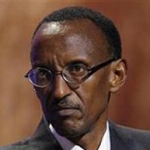
Kagame, angry and upset!
Kigali: President Paul Kagame has angrily dismissed any criticism of the Genocide ideology law coming from donors, rights groups and exiled opposition, saying nobody has the right to undermine what happens in Rwanda, RNA reports.
Since the passing of a law in 2007 criminalizing negating the Genocide � described here as �Genocide Ideology�, fierce critics have claimed that it has been used to stifle free speech and squeeze the opposition. The harshest attack came last year from the Commonwealth Human Rights Initiative, which was opposed to Rwanda�s admission into the British Commonwealth block.
Amnesty International and Human Rights Watch, as well as the US government in its annual human rights reports, have repeated the same attacks. The latest came when York-based Human Rights Watch claimed Wednesday that government was using the law �as a way of targeting and discrediting its critics�.
Amnesty International has also argued that the terms of the law criminalizing �genocidal ideology�, are �vague and ambiguous�. The group also says this law could potentially restrict the ability of the accused to put forward a defence in criminal trials. The offence is punishable by 10 to 25 years� imprisonment.
President Kagame on Friday seemed to have had enough. Addressing the judiciary, senior government officials and diplomats at the Parliamentary building at the start of the judicial year, Mr. Kagame described the criticism as �complete nonsense�.
The President wondered why international media and diplomats accredited to Kigali repeatedly claim the Genocide Ideology law is not clear.
�Sometimes a person wonders��but how come your laws criminalizing divisionism and others against negating the holocaust are not ambiguous?� How come you implement them? What specialty do you have that others cannot have?�, said Mr. Kagame, in a mixture of English and Kinyarwanda.
�What they are trying to say is that all of you here seated with huts and robes have no brains,� he said, amid muted laughter from the audience. The President also accused the west of consistently undermining �Rwandans and Africans� by always being suspicious of everything done on the continent.
With an unusually high tone, suggesting that he was angry and also not reading from the prepared speech, Mr. Kagame fired in English: �We�ve lived this life. We�ve lived the consequences. So, we understand it better than anyone from anywhere else.�
�Apart from this over-bearing attitude of always wanting to decide for others what they should do, what do these people have in their brains�heads that we don�t have?. What is it? Why almost everyday question what people do for themselves?�
Turning to Kinyarwanda, President Kagame told his audience that critics can only be found to be wrong depending on how the country�s institutions are built.
�We ensure all is done with ultimate courage�explain to whoever doesn�t understand�such that even if we remain with some who do not want to understand, just like we even have them,� he said.
Mr. Kagame said criticism from the outside should not make those implementing policies internally to lose morale because they are doing it all for themselves and the country.
�This is the only way that we will silence those who are always speaking nonsense,� he summed.
The judiciary had earlier presented several achievement attained over the past year, and President Kagame was on hand � thanking them. He also promised to avail them with his contribution at anytime �because it is my responsibility�.
Source:rnanews.com.
February 12, 2010 1 Comment
London Manifestation of Rwandans For Cessation of RPF Harassment in Rwanda
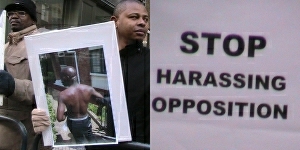
Some banners at London Manifestation
LONDON – On Wednesday 10th February 2010, a group of Rwandans and Congolese from DRC convened from 2.00 pm at the High Commission of Rwanda in UK to protest against the regime of Kigali for harassing Rwandan political opponents.
The manifestation took place in front of the Rwanda House located at 120 � 122 Seymour Place, London W1H.
Slogans on the displayed banners included the following messages: �Democracy for Rwanda Now, Stop Harassing Opposition, Free Joseph Ntawangundi Now.� On some of the banners were pictures showing Joseph�s scars after the beating by RPF militia in Kigali on 3rd February 2010.
The protesters find that people have been patient enough about the crimes and abuses of human rights by the RPF regime against Rwandans.
They are very much inspired by the courageous determination of Mrs Victoire Ingabire Umuhoza, Chair of United Democratic Forces UDF-Inkingi, to politically and pacifically challenge the Kagame regime in Rwanda. They told news reporters that what Victoire Ingabire has started won�t stop until Rwandans have democracy, justice and respect of the basic human rights they have been denied for the last 20 years because of RPF. They expect the world to know more about their suffering and help them make pressure on Paul Kagame to change his policies towards the Rwandan population.
Congolese who joined the protest are fed up by the ongoing humanitarian crisis in the Great Lakes region where occur recurring wars sponsored by international interests in the mineral resources of DRC. All recognize that RPF is the source of all the tragedies in the whole region and agree that re-instauring democracy in Rwanda will greatly ease the suffering of so many millions in the region.
February 11, 2010 2 Comments
Lies and Gacaca As Main Weapon Against Political Opposition in Rwanda
The New Times newspaper of spreading false propaganda about her aide, Joseph Ntawangundi.
A few days after Victoire Ingabire and her assistant Joseph Ntawangundi were nearly lynched by a rowdy group of local militia in the administration offices, the New Times newspaper – mouthpiece of the ruling RPF party of President Paul Kagame – reported that Ntawangundi was a fugitive long wanted by the Gacaca court on charges related to the 1994 genocide.
Here is what The New Times (http://www.newtimes.co.rw/index.php?issue=14163&article=25610) publishes in an article titled:
Ingabire�s assistant a Gacaca fugitive:
� Handed 19 yrs in absentiaKIGALI – Victoire Ingabire�s assistant, Joseph Ntawangundi, the man who came to the limelight in the saga at Kinyinya Sector, is a wanted Genocide fugitive who, in 2007, was sentenced in absentia to 19 years in prison by a Gacaca Court.
Ntawangundi was found guilty by the Gacaca court in Rusenyi cell, Gitwe sector in the former Kibungo Province, present day Ngoma, for killing two young people only identified as Nsabimana and Hategeka.
The two were students of IAVE Gitwe Secondary School in Kibungo where he was a director at the time. He was also found guilty of conspiring with militias to murder eight other people.
According to Beline Uwineza, the coordinator of Gacaca in the Eastern Province, Ntawangundi fled in 1994 to Benaco Refugee Camp in Tanzania before finding his way to Europe.
�His file and arrest warrant have been around. His case was a category two type. We were surprised when we saw his pictures in the news media after all these years,� she said.
�The arrest warrant is still valid of course. The next step will be to make sure he serves his jail term. Gacaca will do everything within its means to bring him to book�.Witnesses testified that Ntawangundi being the director of the school, many students ran to him for protection during the Genocide, but that he kept turning them away and they would then be killed by militias lurking outside.
The two children he killed had also run to him for protection.
He is one of the thousands of people whom Gacaca has sentenced in absentia.
This is the second time that someone connected to the presidential aspirant is discovered to have links to the killings of innocent people during the 1994 genocide against the Tutsi.
Ingabire�s own mother, Therese Dusabe, had also been found guilty earlier on two separate occasions and sentenced to 30 years and life respectively.
According to FDU-Inkingi’s chair Victoire Ingabire, this Gacaca story is a pure lie as Joseph Ntawangundi had left Rwanda in 1993! Read Victoire Ingabire’s press release explaining why in the article: Kigali � Case of Joseph Ntawangundi: Another Evidence of Gacaca Courts Farce in Rwanda.
This is again another proof that the Kagame regime would continue to recourse to any sort of of lies and character assassination propaganda, in order to bar the opposition from fairly challenging him in the upcoming presidential elections.
February 8, 2010 No Comments

